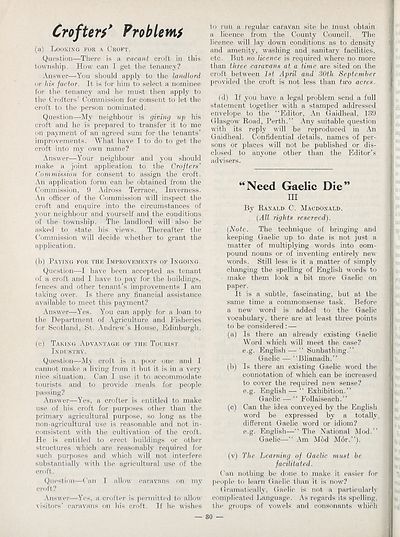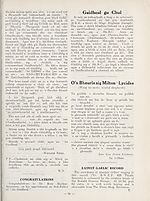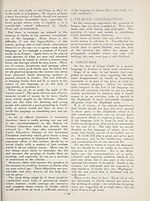An Comunn Gàidhealach Publications > Gaidheal > Volumes 58--62(part), January, 1963--March 1967
(312) Page 80
Download files
Complete book:
Individual page:
Thumbnail gallery: Grid view | List view

Crofter/ Problemf
(a) Looking for a Croft.
Question—There is a vacant croft in this
township. How can I get the tenancy?
Answer—You should apply to the landlord
or his factor. It is for him to select a nominee
for the tenancy and he must then apply to
the Crofters’ Commission for consent to let the
croft to the person nominated.
Question—My neighbour is giving up his
croft and he is prepared to transfer it to me
on payment of an agreed sum for the tenants’
improvements. What have I to do to get the
croft into my own name?
Answer—Your neighbour and you should
make a joint application to the Crofters’
Commission for consent to assign the croft.
An application form can be obtained from the
Commission, 9 Adross Terrace, Inverness.
An officer of the Commission will inspect the
croft and enquire into the circumstances of
your neighbour and yourself and the conditions
of the township. The landlord wdll also be
asked to state his views. Thereafter the
Commission will decide whether to grant the
application.
(b) Paying for the Improvements of Ingoing.
Question—I have been accepted as tenant
of a croft and I have to pay for the buildings,
fences and other tenant’s improvements I am
taking over. Is there any financial assistance
available to meet this payment?
Answer—Yes. You can apply for a loan to
the Department of Agriculture and Fisheries
for Scotland, St. Andrew’s House, Edinburgh.
(c) Taking Advantage of the Tourist
Industry.
Question—My croft is a poor one and I
cannot make a living from it but it is in a very
nice situation. Can I use it to accommodate
tourists and to provide meals for people
passing?
Answer—Yes, a crofter is entitled to make
use of his croft for purposes other than the
primary agricultural purpose, so long as the
non-agricultural use is reasonable and not in¬
consistent with the cultivation of the croft.
He is entitled to erect buildings or other
structures which are reasonably required for
such purposes and which will not interfere
substantially with the agricultural use of the
croft.
Question—Can I allow caravans on mv
croft?
Answer—Yes, a crofter is permitted to allow
visitors’ caravans on his croft. If he wishes
to fun a regular caravan site lie must obtain
a licence from the County Council. The
licence will lay down conditions as to density
and amenity, washing and sanitary facilities,
etc. But no licence is required where no more
than three caravans at a time are sited on the
croft between 1st April and 30th September
provided the croft is not less than two acres.
(d) If you have a legal problem send a full
statement together with a stamped addressed
envelope to the “Editor, An Gaidheal, 139
Glasgow Road, Perth.” Any suitable question
with its reply will be reproduced in An
Gaidheal. Confidential details, names of per¬
sons or places will not be published or dis¬
closed to anyone other than the Editor's
advisers.
“Need Gaelic Die”
in
By Ranald C. Macdonald.
(Mil rights reserved).
{Note. The technique of bringing and
keeping Gaelic up to date is not just a
matter of multiplying words into com¬
pound nouns or of inventing entirely new
words. Still less is it a matter of simply
changing the spelling of English words to
make them look a bit more Gaelic on
paper.
It is a subtle, fascinating, but at the
same time a commonsense task. Before
a new word is added to the Gaelic
vocabulary, there are at least three points
to be considered : —
(a) Is there an already existing Gaelic
Word which will meet the case?
e.g. English — ” Sunbathing.”
Gaelic — ‘ ‘ Blianadh. ’ ’
(b) Is there an existing Gaelic word the
connotation of which can be increased
to cover the required new sense?
e.g. English — “Exhibition.”
Gaelic — “ Follaiseach.”
(c) Can the idea conveyed by the English
word be expressed by a totally
different Gaelic word or idiom?
e.g. English—“ The National Mod.”
Gaelic—“ Am Mod Mor.”).
(v) The Learning of Gaelic must be
facilitated.
Can nothing be done to make it easier for
people to learn Gaelic than it is now?
dramatically, Gaelic is not a particularly
complicated Language. As regards its spelling,
the groups of vowels and consonants which
(a) Looking for a Croft.
Question—There is a vacant croft in this
township. How can I get the tenancy?
Answer—You should apply to the landlord
or his factor. It is for him to select a nominee
for the tenancy and he must then apply to
the Crofters’ Commission for consent to let the
croft to the person nominated.
Question—My neighbour is giving up his
croft and he is prepared to transfer it to me
on payment of an agreed sum for the tenants’
improvements. What have I to do to get the
croft into my own name?
Answer—Your neighbour and you should
make a joint application to the Crofters’
Commission for consent to assign the croft.
An application form can be obtained from the
Commission, 9 Adross Terrace, Inverness.
An officer of the Commission will inspect the
croft and enquire into the circumstances of
your neighbour and yourself and the conditions
of the township. The landlord wdll also be
asked to state his views. Thereafter the
Commission will decide whether to grant the
application.
(b) Paying for the Improvements of Ingoing.
Question—I have been accepted as tenant
of a croft and I have to pay for the buildings,
fences and other tenant’s improvements I am
taking over. Is there any financial assistance
available to meet this payment?
Answer—Yes. You can apply for a loan to
the Department of Agriculture and Fisheries
for Scotland, St. Andrew’s House, Edinburgh.
(c) Taking Advantage of the Tourist
Industry.
Question—My croft is a poor one and I
cannot make a living from it but it is in a very
nice situation. Can I use it to accommodate
tourists and to provide meals for people
passing?
Answer—Yes, a crofter is entitled to make
use of his croft for purposes other than the
primary agricultural purpose, so long as the
non-agricultural use is reasonable and not in¬
consistent with the cultivation of the croft.
He is entitled to erect buildings or other
structures which are reasonably required for
such purposes and which will not interfere
substantially with the agricultural use of the
croft.
Question—Can I allow caravans on mv
croft?
Answer—Yes, a crofter is permitted to allow
visitors’ caravans on his croft. If he wishes
to fun a regular caravan site lie must obtain
a licence from the County Council. The
licence will lay down conditions as to density
and amenity, washing and sanitary facilities,
etc. But no licence is required where no more
than three caravans at a time are sited on the
croft between 1st April and 30th September
provided the croft is not less than two acres.
(d) If you have a legal problem send a full
statement together with a stamped addressed
envelope to the “Editor, An Gaidheal, 139
Glasgow Road, Perth.” Any suitable question
with its reply will be reproduced in An
Gaidheal. Confidential details, names of per¬
sons or places will not be published or dis¬
closed to anyone other than the Editor's
advisers.
“Need Gaelic Die”
in
By Ranald C. Macdonald.
(Mil rights reserved).
{Note. The technique of bringing and
keeping Gaelic up to date is not just a
matter of multiplying words into com¬
pound nouns or of inventing entirely new
words. Still less is it a matter of simply
changing the spelling of English words to
make them look a bit more Gaelic on
paper.
It is a subtle, fascinating, but at the
same time a commonsense task. Before
a new word is added to the Gaelic
vocabulary, there are at least three points
to be considered : —
(a) Is there an already existing Gaelic
Word which will meet the case?
e.g. English — ” Sunbathing.”
Gaelic — ‘ ‘ Blianadh. ’ ’
(b) Is there an existing Gaelic word the
connotation of which can be increased
to cover the required new sense?
e.g. English — “Exhibition.”
Gaelic — “ Follaiseach.”
(c) Can the idea conveyed by the English
word be expressed by a totally
different Gaelic word or idiom?
e.g. English—“ The National Mod.”
Gaelic—“ Am Mod Mor.”).
(v) The Learning of Gaelic must be
facilitated.
Can nothing be done to make it easier for
people to learn Gaelic than it is now?
dramatically, Gaelic is not a particularly
complicated Language. As regards its spelling,
the groups of vowels and consonants which
Set display mode to:
![]() Universal Viewer |
Universal Viewer | ![]() Mirador |
Large image | Transcription
Mirador |
Large image | Transcription
| An Comunn Gàidhealach > An Comunn Gàidhealach Publications > Gaidheal > Volumes 58--62(part), January, 1963--March 1967 > (312) Page 80 |
|---|
| Permanent URL | https://digital.nls.uk/127152525 |
|---|
| Description | This contains items published by An Comunn, which are not specifically Mòd-related. It includes journals, annual reports and corporate documents, policy statements, educational resources and published plays and literature. It is arranged alphabetically by title. |
|---|
| Description | A collection of over 400 items published by An Comunn Gàidhealach, the organisation which promotes Gaelic language and culture and organises the Royal National Mòd. Dating from 1891 up to the present day, the collection includes journals and newspapers, annual reports, educational materials, national Mòd programmes, published Mòd literature and music. |
|---|---|
| Additional NLS resources: |
|

